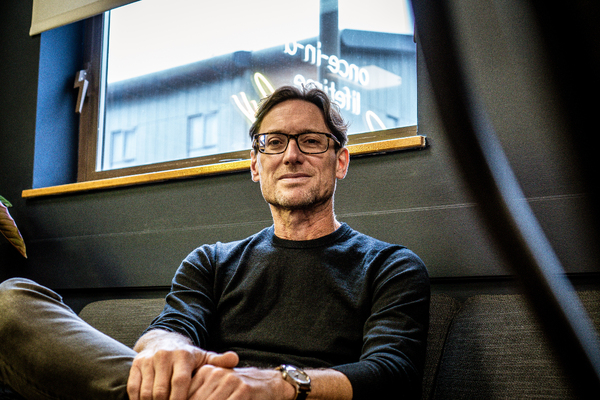Explore MD: ‘Our single biggest challenge is growing without doing more damage’
 Sarah Dennis
Sarah DennisBecoming B Corp Certified was the culmination of a two-and-a-half year effort by Explore Worldwide. TTG caught up with managing director Michael Edwards to find out why it was such an important step for the business, and how its first Purpose Paper will drive its B Corp journey and longer-term commitment to responsible travel.
“You don’t get people saying, ‘I want to go on a sustainable holiday’. I think that will happen. But right now, more people are appreciating it’s a big part of the mix.”
Explore Worldwide’s managing director Michael Edwards is speaking to TTG as the adventure specialist publishes its Purpose Paper – setting out its commitments to people, places and the planet for 2024 and beyond, as well as its achievements over the past year.
These include hitting its carbon reduction targets, the establishment of the Explore Foundation in July 2023, which raised £60,000 for earthquake relief for Morocco in just 24 hours, and the introduction of sustainability-linked KPIs across the business – including climate-linked targets bonuses.
"The icing on the cake" as Edwards describes it, came on Monday (12 February) when the business formally became B Corp Certified – the culmination of a two-and-a-half year process dating back to November 2021, which eventually saw Explore submit its application in January last year.
Growing business, not emissions
However, while the operator exceeded its target of a 7% reduction in carbon intensity last year, Edwards acknowledges this was driven by several quick wins, and that such steep targets will be harder to achieve in future as more and more progress is made.
“We were able to set a target of 7% last year, which was quite meaty, but if we look at our commitment to the Glasgow Declaration, we knew there was a lot we could do to reduce that, whether that was using different hotels or offering rail travel instead of flights.
“The target this year is 4.5%, which looks less ambitious, but is actually hard to achieve. It will get harder every year because you are somewhat dependent on third parties to change their practices, and air travel is still a big part of the proposition that we have less control over.”
The Purpose Paper also reveals Explore’s emissions, in absolute terms, grew significantly last year – up by 82% – although this was still a 10% reduction on 2019. Growth in passenger numbers and business travel needs were two of the main contributors, as well as flights booked by customers.
“There’s no doubt the single biggest challenge in our industry in how do you grow without doing more damage,” Edwards stresses. “And we aren’t ashamed of wanting to be a growing business. We opened an office in Australia this year and we’re growing in the US too.”
’In our space, if you’re not B Corp, it’s a disadvantage’
He adds: “The first thing is to bring down the per-passenger carbon footprint so when you travel with us you know your own individual carbon footprint every year is going to be lower as a result of initiatives we’ve put in.
"Flights booked by passengers is toughest nut to crack, but it will come down. It’s up to us to make customers aware how they can do that.”
Rail rising
Key to this will be an enhanced focus on rail travel, both as a means to replace internal flying on trips, but also making rail part of the offering and experience in destination that Edwards insists simply doesn’t come with flying.
"Rail is going to be a big part of the solution, particularly for Europe," he says. "Outside of Europe, rail as part of the experience will become much more of a feature.
"The thing we’re doing mostly is looking at how we can remove internal flights and add a rail journey, but it’s about adding a rail journey that makes the trip more enjoyable."
He notes the need to support the trade, which currently accounts for around 25% of Explore’s business and is its fastest growing sales route, with “selling the virtue”.
"It’s our responsibility not just to remove the flight, but to really promote the joy of travelling slightly differently," he continues. "When we come to agents, we’ll be speaking a lot more about why their clients might want to do an eight-hour train journey.
"They’ll get a better travel experience, they’ll feel more connected to the country, and they’ll probably come away with better memories and mingle more with the local community. And of equal importance, their carbon footprint will be a lot lower.
"We see it as an opportunity to reinvent some of our programmes to make them more experiential, and rail does make most trips of like ours more experiential.”
Talking the walk
Carbon reduction initiatives are not just levied at product. Explore staff electing to travel by rail instead of flying for their personal holidays are given extra leave to allow for the extra time a rail journey may take.
"You don’t lose a day travelling by train; we reward you by giving you an extra day to allow you to take the option,” Edwards says, who also confirms people, places and planet targets are linked to board level and general manager bonuses.
"If I don’t hit my carbon reduction target, I don’t benefit – and on some level, I’ve failed," Edwards acknowledges. “How I see my job is that it’s living up to the commitments of the Purpose Paper.
"It’s relatively easy to make money; it’s not that easy to make money and do these things. If you can do both, that’s where a modern business should be setting its ambitions.“
Edwards insists this year’s Purpose Paper serves to highlight the ambitions Explore – and he personally – has for the years ahead.
“There is lots of evidence to suggest if you are genuinely a purpose-driven business and it’s authentic, more people come to you. The Purpose Paper highlights what we’ve done, but it’s only the beginning. For me it’s about what’s next, how much further can we go, and how much more ambitious we can be."
Sign up for weekday travel news and analysis straight to your inbox

Sarah Dennis
Supplier Directory
Find contacts for 260+ travel suppliers. Type name, company or destination.

















